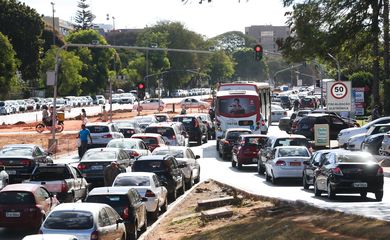Brazil needs to be less reliant on individual transport, scientist says




Under the Paris Agreement, Brazil commits to slashing 37% of greenhouse gas emissions by 2025, and 43% by 2030 from the rate reported in 2005.
Brazil needs to be less dependent on individual transport and favor public means of transportation to meet the goal of cutting greenhouse emissions as set forth in the Paris Agreement, ratified by the country in 2016. The statement was made by environmental scientist Walter Figueiredo de Simoni, Transport Coordinator at the Climate and Society Institute, an NGO dedicated to fighting the causes of climate change.
Simoni and other experts are to take part in the first International Workshop on Transport Decarbonization, on Wednesday (Dec. 6), which will discuss experiences and strategies related to sustainable transport from different countries. Under the Paris Agreement, Brazil commits to slashing 37% of greenhouse gas emissions by 2025, and 43% by 2030 from the rate reported in 2005.
According to Walter de Simoni, even though the improvement in public transport across the cities is among the goals Brazil pledges to meet in the document submitted to the UN, no specific policies have been unveiled in this connection. “[The goal] has been vaguely [set], we must outline a plan in practical terms—whether it should entail bringing in more investment or expanding the city's space [dedicated to public transport],” he says.
He goes on to say that another objective to be accomplished by Brazil is to increase the use of biofuels. “Nothing has been disclosed by Brazil for any of these options. We're not sure as to how these issues will be addressed with specific targets. Tackling these problems is very much desired.”
Simoni further argues that the country should be less reliant on road vehicles for cargo. “It's an economic matter we're talking about. Where are the goods produced in the country and how do they reach their final consumers? Cargoes are shipped in trucks on fossil fuels. If we want to do achieve our goal, we have to face the cargo shipment challenge in Brazil in the long run, and go about devising a plan to be more efficient in the way we ship things,” he said.
The scientist expects the International Workshop on Transport Decarbonization to discuss practical avenues for bringing about these changes, in addition to studying the experiences of other countries. “Countries are doing it their own way. We'll see the examples of Chile and Germany,” he added.
In addition to the Climate and Society Institute, the event is being organized by the Energy and Environment Institute and by the German Embassy. Morning talks will center on international experiences. In the afternoon, sessions are expected to include proposals on decarbonizing Brazil's public transport as well as technological trends and novelties in the field.
Translated by Fabrício Ferreira
Fonte: Brazil needs to be less reliant on individual transport, scientist says



